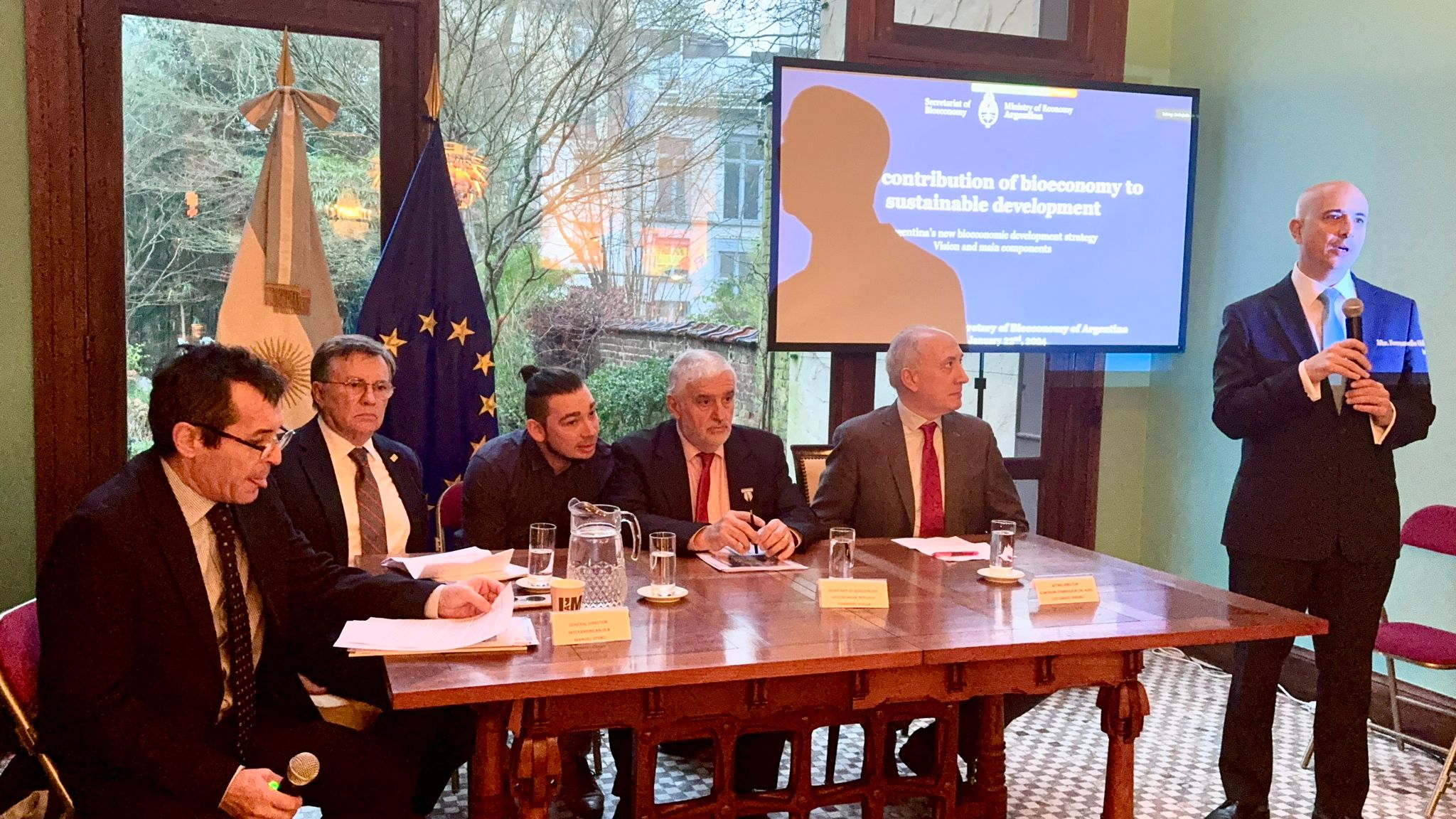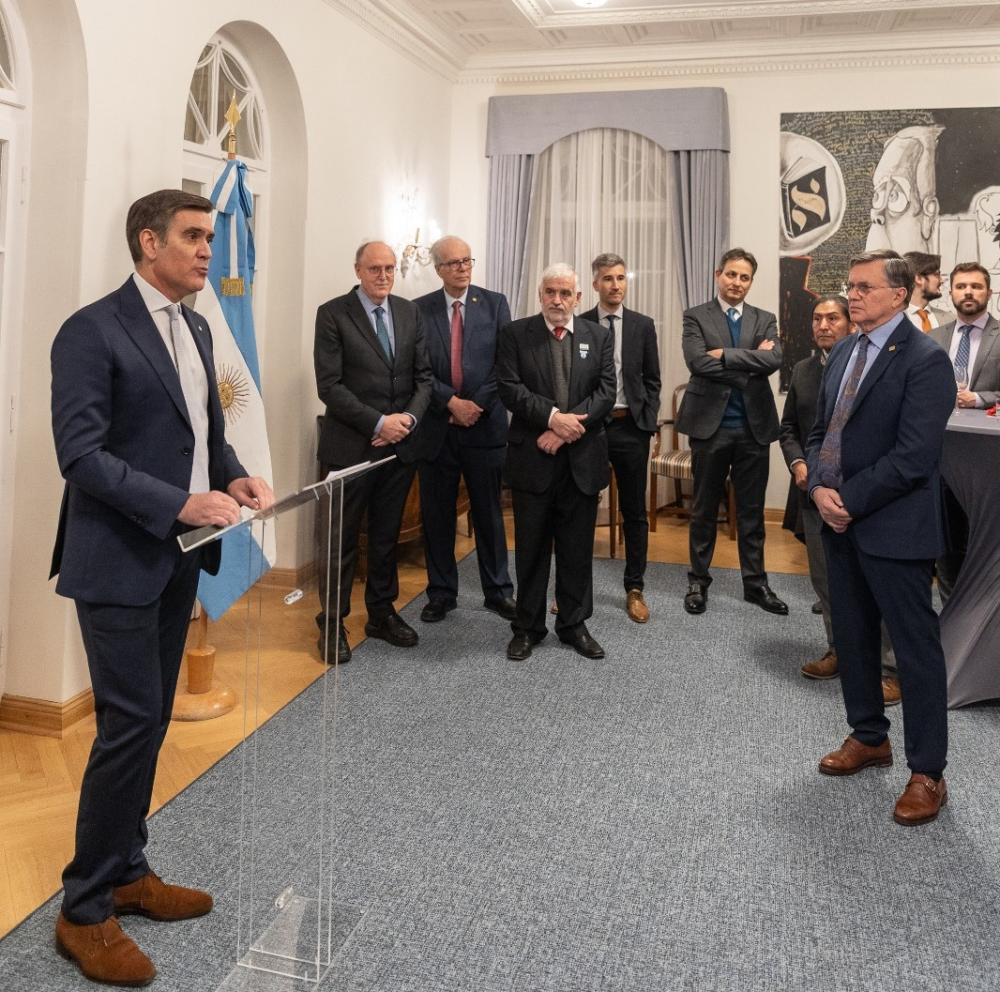Otero exchanged ideas and information with European Commission agricultural, trade, environmental and legal officials in various meetings in the Belgian capital, aimed at furthering collaboration and establishing new linkages in areas such as the bioeconomy; climate change mitigation and adaptation; digital agriculture; family farming and international trade, among others.

Brussels, Belgium, 25 January 2024 (IICA) – The Director General of the Inter-American Institute for Cooperation on Agriculture (IICA), Manuel Otero, visited the city of Brussels, home to the principal European Union (EU) institutions, where he promoted a joint cooperation agenda and reported on the transformation taking place in the Latin American and Caribbean agriculture sector in terms of production sustainability.
The EU, as well as its Member States, formalized their relationship with IICA in1991, when the body became a Permanent Observer of the agricultural and rural development organization. Since then, it has assisted in strengthening agricultural activity and improving rural well-being in the Americas.
Otero exchanged ideas and information with European Commission agricultural, trade, environmental and legal officials in various meetings in the Belgian capital, aimed at furthering collaboration and establishing new linkages in areas such as the bioeconomy; climate change mitigation and adaptation; digital agriculture; family farming and international trade, among others.
Among the landmark EU-funded projects undertaken by IICA are PROCAGICA—which strengthened the climate change resilience of small- and medium-scale Central American coffee farmers—and AGRO INNOVA, which has worked to improve food security and bolster the position of vulnerable farmers in the Central American Dry Corridor.
“Deepening and expanding the ties between our hemisphere and the European Union is essential, bearing in mind the global and cross-cutting nature of today’s challenges. The projects we have executed in the past and the positive expectations with respect to future initiatives demonstrate the need for continuous collaboration to drive sustainable development and improve living conditions in rural areas”, maintained Otero, who was accompanied to the meetings by Jorge Werthein, Special Advisor to the Director General; Soraya Villarroya, Head of IICA’s Permanent Office for Europe, based in Madrid; and Tomás Abadía, a consultant to IICA with extensive experience in matters related to the European Union.
Otero went on to point out that, “Latin America and the Caribbean is the world’s major net food exporting region and one that boasts a wealth of natural resources, which have positioned it as the guarantor of the planet’s environmental sustainability. These conditions have led to the creation of a significant number of sizeable projects. Most notable among them is PROCAGICA, which has modernized coffee cultivation in Central America, where this crop is the backbone of the economy, and AGRO INNOVA, which focuses on family farmers”.
“We are going to continue expanding our project portfolio—he pledged—with the aim of contributing to climate change adaptation, strengthening the competitiveness of family farmers and promoting the role of the bioeconomy, which is a priority in IICA’s technical cooperation efforts. Both of our organizations are interested in strengthening dialogue and building an increasingly synergistic relationship that includes the public and private sectors and civil society organizations”.
Otero also used the opportunity to emphasize IICA’s role as a bridge and promotor of dialogue between both regions.
The role of the bioeconomy
While in Brussels, Otero and Argentina’s Secretary of Agriculture, Livestock and Fisheries, Fernando Vilella, attended a seminar focusing on the bioeconomy’s contribution to sustainable development and the extraordinary diversification potential of Latin American and Caribbean exports.
The seminar was held at the Argentinian Embassy to the EU and sought to inform European officials about the projects already underway in the region that are improving the sustainability of agricultural activity in Argentina and other Latin American countries.
The meeting was attended by members of several delegations that play different roles in the home city of the economic and political association of European countries.

Prior to his Brussels stop, Otero was in Berlin, attending the Global Forum for Food and Agriculture (GFFA), organized by the German Government. The GFFA brought together government officials, members of international organizations and experts from across the world, to discuss how to strengthen agrifood systems and coordinate efforts aimed at achieving the Sustainable Development Goals (SDGs).
Senior Latin American officials from the sector were also in attendance, among them, Paulo Teixeira, Brazil’s Minister of Agricultural Development and Family Farming; Carlos Giménez, Paraguay’s Minister of Agriculture and Livestock; Fernando Mattos, Minister of Agriculture and Fisheries of Uruguay, as well as Secretary Vilella.
Otero’s Berlin mission also included a meeting with Cem Özdemir, Federal Minister of Agriculture and Food of Germany, who agreed on the need to bolster dialogue between the Americas and Europe, and to move towards developing joint strategies to transform the activity, while focusing on the link between agriculture and the environment.
More information:
Institutional Communication Division.
comunicacion.institucional@iica.int











